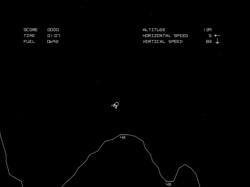| Lunar Lander | |
|---|---|
 1979 arcade version of Lunar Lander, with vector graphics | |
| Genre(s) | Space flight simulation |
| Platform(s) | Minicomputers, personal computers, arcade |
| First release | 1969 |
Lunar Lander is a genre of video games loosely based on the 1969 landing of the Apollo Lunar Module on the Moon. In Lunar Lander games, players control a spacecraft as it falls toward the surface of the Moon or other astronomical body, using thrusters to slow the ship's descent and control its horizontal motion to reach a safe landing area. Crashing into obstacles, hitting the surface at too high a velocity, or running out of fuel all result in failure. In some games in the genre, the ship's orientation must be adjusted as well as its horizontal and vertical velocities.
The first Lunar Lander game was a text-based game published under many names, including the Lunar Landing Game, written in the FOCAL programming language for the Digital Equipment Corporation (DEC) PDP-8 minicomputer by Jim Storer while a high school student in the fall of 1969. Several other versions were written soon after by other programmers in FOCAL and BASIC. The original Lunar Landing Game was converted to BASIC by David H. Ahl, who included three versions in his 1973 book 101 BASIC Computer Games. By the end of the decade, the type of game was collectively known as a "lunar lander" game.
In 1973, DEC commissioned the creation of a real-time, graphical version of Lunar Lander, which was intended to showcase the capabilities of their new DEC GT40 graphics terminals. The game, written by Jack Burness and named Moonlander, was distributed with DEC computers and displayed at trade shows. In 1979, Atari released a vector graphics arcade video game version of the concept as Lunar Lander. It has a fuel-for-money system allowing the player to purchase more fuel to continue their current game.
Lunar Lander games were a popular concept for home computer systems. Commodore published a version called Jupiter Lander for their VIC-20 in 1981. That same year, Electronic Games wrote that "sometimes it seems as though every company capable of copying a cassette is trying to sell a game on this theme."[1]